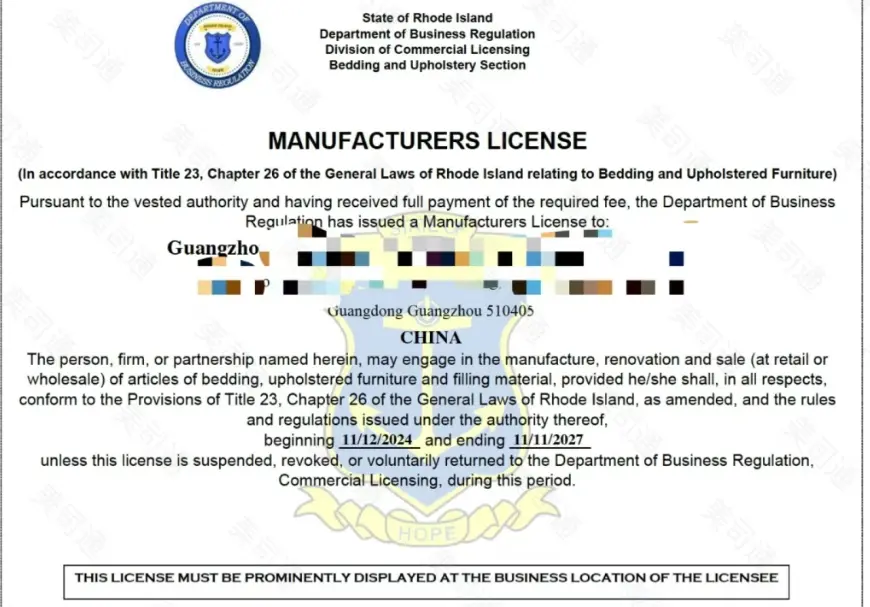
What is U.S. Law Label Registration?
Among the many products entering the U.S. market, the Law Label is a critical compliance requirement—especially for products containing filling materials such as bedding, furniture, and cushions. The Law Label is not only a legal requirement but also a demonstration of responsibility to consumers. Having a Law Label increases brand trustworthiness. If you want your business to be compliant, understanding U.S. Law Label registration is essential. When is it requiRED? Which states mandate it? Today, we’ll answer all of these questions. Below is a Law Label certificate recently registered in Rhode Island for a client from Guangdong:

What is a U.S. Law Label?
A Law Label is a special tag that discloses the internal materials and manufacturing information of products containing filling materials. It was created to protect consumers and ensure the materials used are safe and hygienic. Typical information found on a Law Label includes:
- Filling Material Declaration: e.g., "100% New Polyester Fiber" or "Down"
- Manufacturer Information: Name, address, and Registration Number (RN)
- Non-removal Warning: e.g., “Under penalty of law this tag is not to be removed except by the consumer”
Products That Require a Law Label
Law Labels are required for products that contain filling materials. These include:
- Bedding Products: Pillows, mattresses, comforters, blankets, mattress pads
- Furniture: Sofas, chairs, cushions, recliners, upholstered items
- Children's Products: Crib mattresses, child car seats, stuffed toys
- Pet Products: Pet beds, padded pet furniture
- Other Filled Goods: Yoga mats, exercise mats, cushions, and similar items
If your product contains any kind of stuffing and is sold in the U.S., a Law Label is mandatory.
When Is Law Label Registration Required?
You must register for a Law Label under these conditions:
- Selling Filled Products: If your product falls under the above categories and is being sold in the U.S.
- Interstate Commerce: States like California, New York, and Texas have strict enforcement. Selling across mULtiple states means you must comply with each state’s law.
- E-commerce Sales: Platforms like Amazon, eBay, and Walmart require compliant labeling, or your listings risk removal or penalties.
- Imported Goods: If your product is manufactured outside the U.S. and imported for sale.
- Brand Trust: Having a Law Label improves transparency and builds consumer confidence.
U.S. State Requirements for Law Labels
- States that Require Law Label Registration (14 states):
California, Connecticut, Delaware, Massachusetts, New York, North Carolina, Ohio, Pennsylvania, Rhode Island, Utah, Virginia, West Virginia, Oklahoma, and Detroit (special area in MIChigan)
- States that Require Law Labels but Not Registration:
Arizona, Arkansas, Florida (for certain products), Nevada (for certain products), Hawaii, New Jersey, Minnesota, Wisconsin
- States with No Law Label Requirement:
Alabama, Alaska, Louisiana, Montana, Oregon, Washington
Note: Even in states without Law Label laws, it's highly recommended to comply for national consistency and interstate sales.
How to Register a Law Label
To register a Law Label, follow these steps:
1. Apply for a Factory Registration Number (URN)
- This is your unique identifier and can be applied for in any of the 14 mandatory states. Rhode Island is often the fastest (1–2 weeks).
2. Design the Label
- Include accurate fill material descriptions, your URN, and the legal warning.
3. Submit the Application
- Through state regulatory departments or authorized third-party service providers.
4. Renew as Required
- Some states require annual or biennial renewals of your registration.
Risks of Not Registering
- Product Removal: Non-compliant products may be taken down from sales platforms.
- Legal Penalties: Fines or enforcement actions may be applied.
- Brand Reputation Damage: Consumers may lose trust, and you could face legal challenges.
Law Label registration is a legal requirement and a key step in ensuring safe and transparent product sales in the U.S. market. Proper registration not only helps you avoid penalties but also enhances your brand credibility. If you’re planning to sell filled products in the U.S., consider professional assistance to ensure full compliance with Law Label regulations.
Email:hello@jjrlab.com
Write your message here and send it to us
 How to get Australia SAA Compliance?
How to get Australia SAA Compliance?
 Does Canada Require RoHS Compliance
Does Canada Require RoHS Compliance
 EU CE LVD, EMC, RoHS Directives Compliance Guide
EU CE LVD, EMC, RoHS Directives Compliance Guide
 Quick Guide to the CE-LVD Low Voltage Directive
Quick Guide to the CE-LVD Low Voltage Directive
 Global Certification Guide for Lithium Batteries
Global Certification Guide for Lithium Batteries
 Compliance of Amazon 18650 Lithium Battery Product
Compliance of Amazon 18650 Lithium Battery Product
 What is CE Certification and EU Authorized Represe
What is CE Certification and EU Authorized Represe
 What Are the Lithium Battery Safety Tests?
What Are the Lithium Battery Safety Tests?
Leave us a message
24-hour online customer service at any time to respond, so that you worry!




